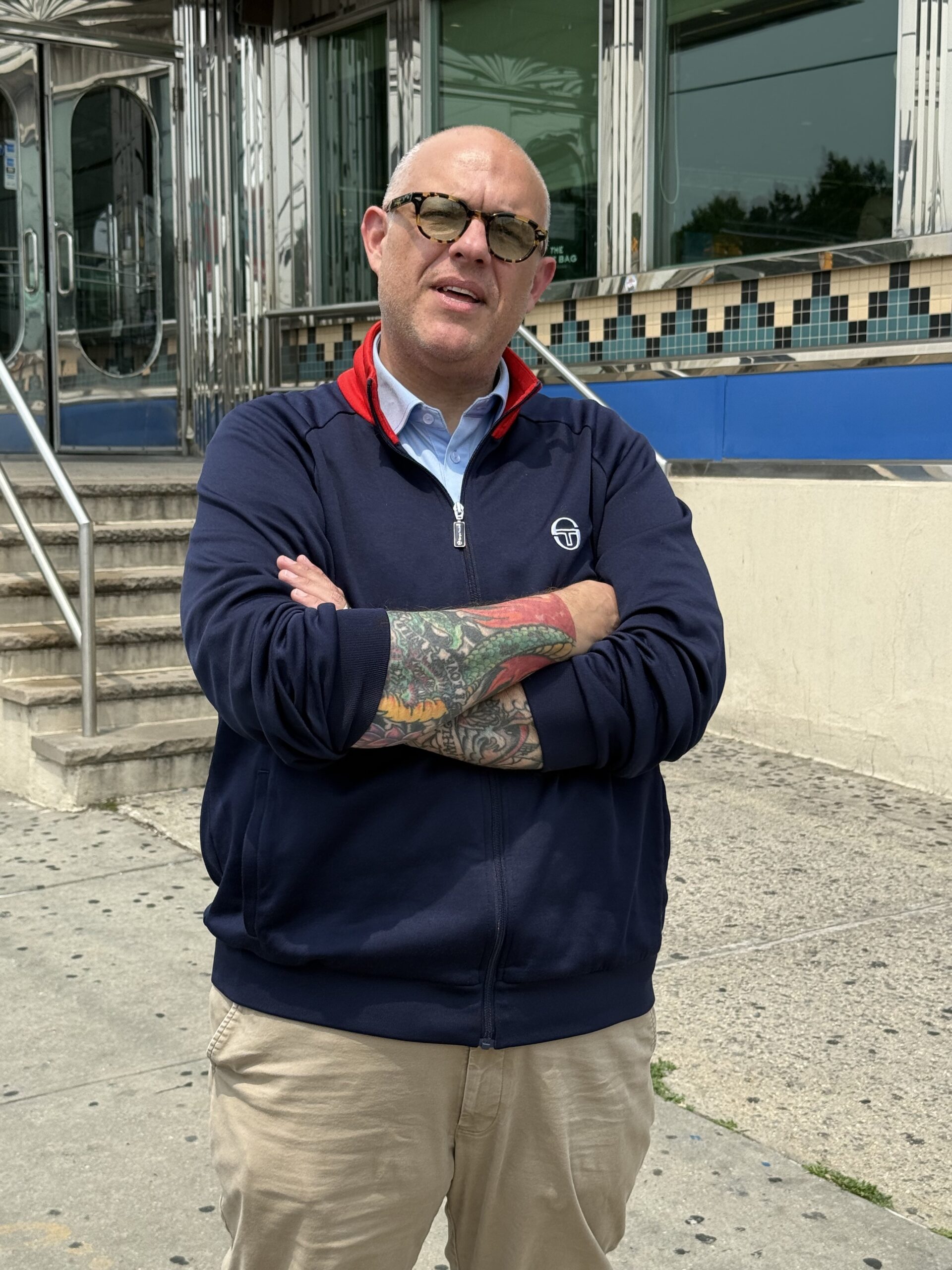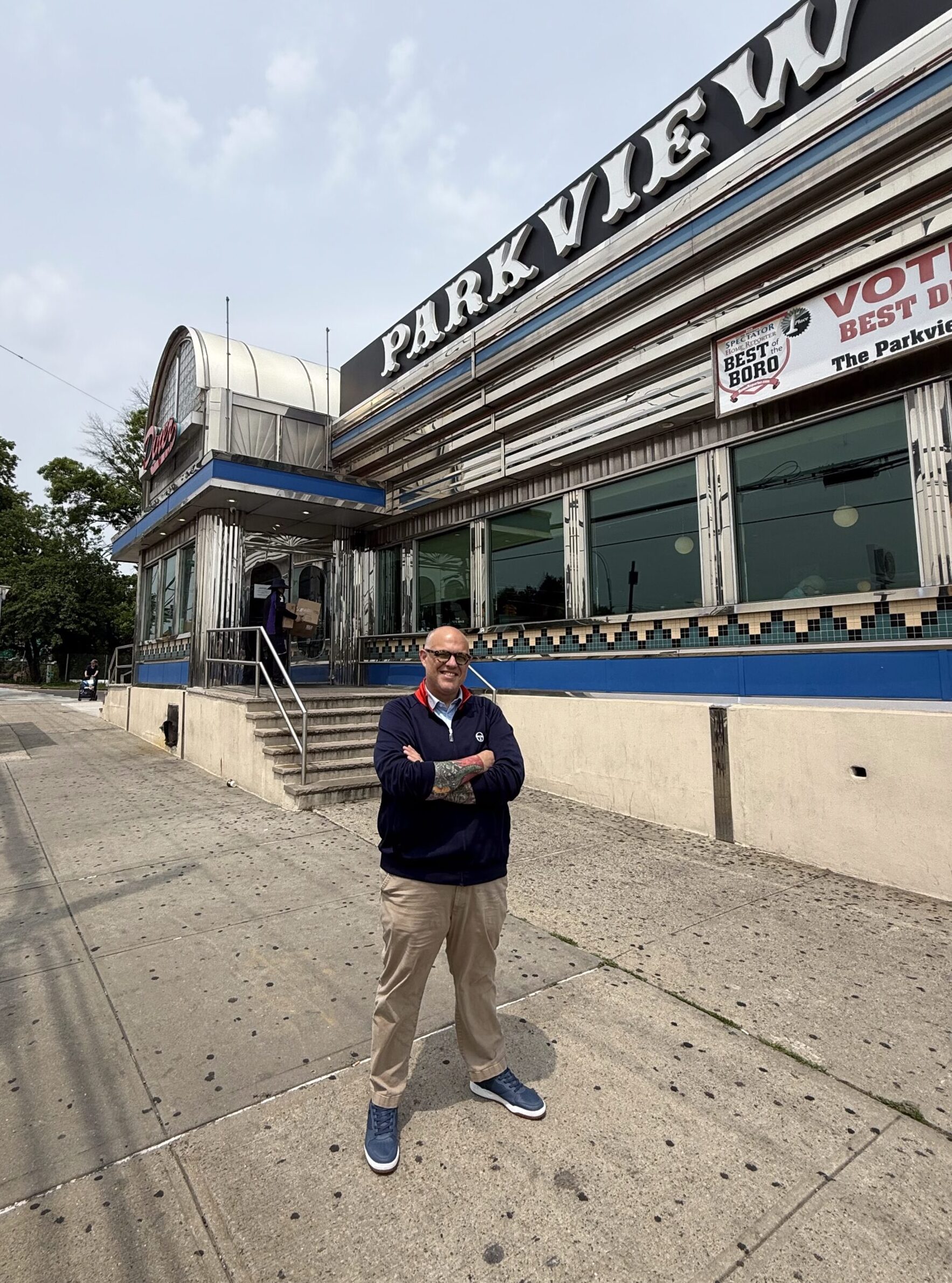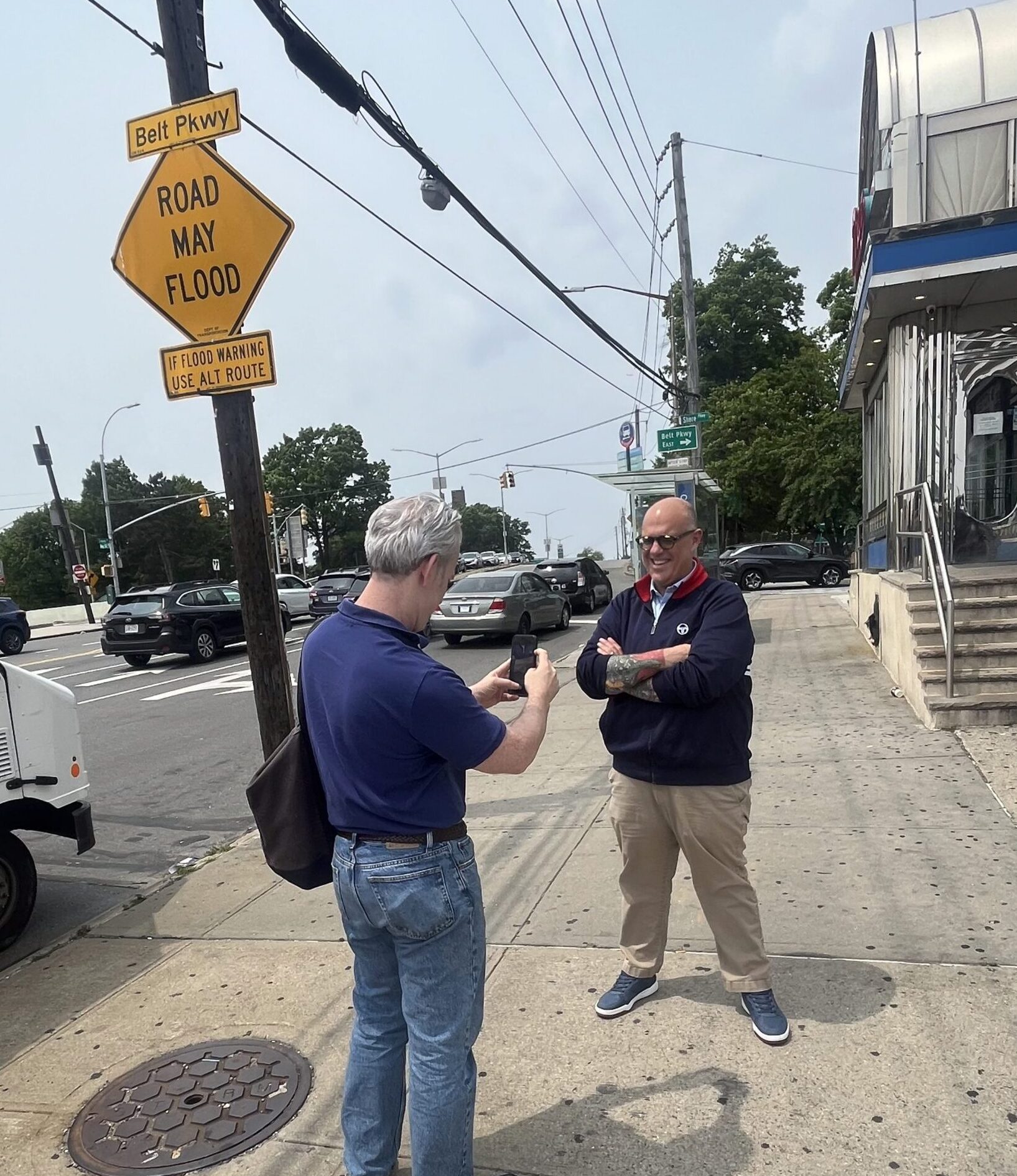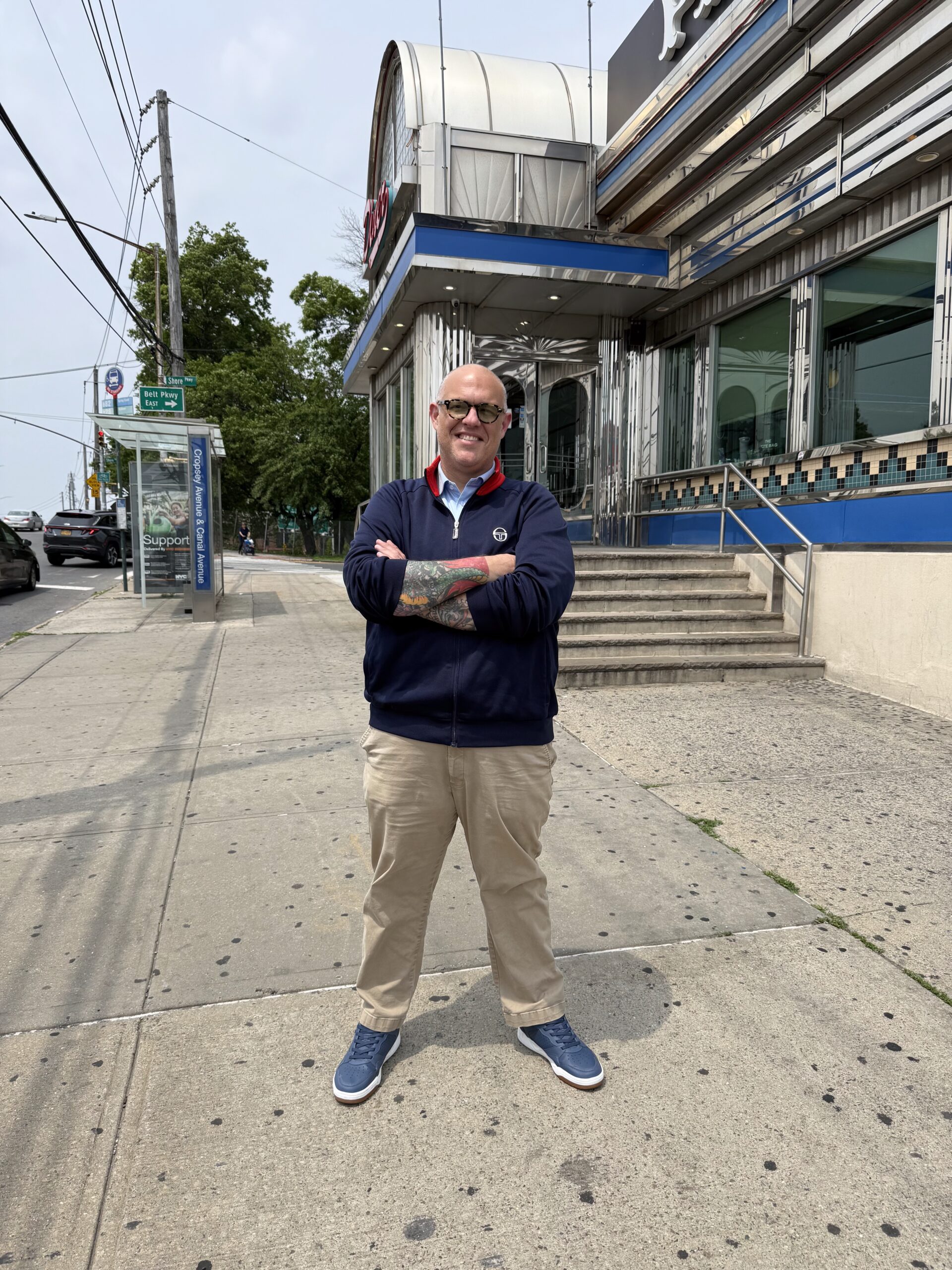VOTE
“Fuck the Decorum”: New York Punk Justin Brannan Wants to Be Your Comptroller
FRIDAY 1:26 PM JUNE 13, 2025 CONEY ISLAND
On Tuesday, New Yorkers will go to the polls to cast their votes in a hotly contested mayoral primary pitting former governor Andrew Cuomo against a motley crew of challengers lead by the insurgent Zohran Mamdani. A frenzied campaign season reached a fever pitch earlier this week when one mayoral hopeful, City Comptroller Brad Lander, was detained by ICE agents at a federal immigration courthouse in Manhattan—the latest instance of federal agents arresting Democratic elected officials as the Trump Administration enacts a ruthless crackdown on immigration, felt most harshly in blue cities.
Running to replace Lander is City Councilmember Justin Brannan, the kind of colorful character one might not expect to be especially well-suited to overseeing the city’s fiscal health, from managing its $273.4 billion public pension fund to auditing city agencies and reviewing government contracts. “If the Mayor is CEO,” explains Brannan, “the comptroller is CFO.” But the 46-year-old New York City native—whose tattoo sleeves betray his past involvement in the hardcore punk bands Indecision and Most Precious Blood—two didn’t always harbor political ambitions. “Never in a billion years did I think I would get into politics,” he told our editor-in-chief Mel Ottenberg when the two got together at the Parkview Diner in Coney Island last week. “As a teenager, politics was old white guys in Washington talking about shit that had no effect on my day-to-day life.” Eventually, Brannan would come to realize he was called to fight for the everyman. In a wide-ranging conversation below, he talked to us about New York’s affordable housing crisis, the Democrats’ messaging problem, and what it’s like to go toe-to-toe with Mayor Eric Adams everyday. “Happy to do it,” he quipped.
———
MEL OTTENBERG: You’re being recorded.
JUSTIN BRANNAN: Oh, Jesus.
OTTENBERG: I know. [Laughs] How are you doing?
BRANNAN: Good. How are you, man? Nice to meet you.
OTTENBERG: It’s nice to meet you, too.
BRANNAN: Did you get stuck in all that traffic too?
OTTENBERG: I did. Weirdly it said 37 minutes but it took an hour. Anyway, here we are. So you’re doing really well, right?
BRANNAN: I mean, we think so, but we don’t know. I spoke to the current comptroller who’s running for Mayor, Brad Lander, and I was like, “On election day, did you have any idea if you were going to win or lose?” He’s like, “We had no idea.” I think when you’re the undercard, the mayor’s race is the Muhammad Ali title fight, right? People just aren’t zoomed in. They know who they’re voting for for mayor, but even 10 days out, the undercard, they’re not zoomed in.
OTTENBERG: Well, it’s fun that I’m here interviewing you because the comptroller does so much.
BRANNAN: Oh, it’s a huge role. It’s the second most powerful spot in city government, and your job is to oversee the budget and conduct audits, and the main responsibility is overseeing and managing pension funds. So the $300 billion pension system, that’s your main responsibility.
OTTENBERG: Meaning what?
BRANNAN: Your retirement account is managed by the city, so it’s almost a little under a million retirees who rely on the five different pension systems.
OTTENBERG: And tell Interview readers what your current job is, Justin.
BRANNAN: I currently serve as chair of the Finance Committee of the City Council. So my day job has basically been fighting every day with Eric Adams. Happy to do it. I mean, this is what got me thinking about running for comptroller. I’m not just looking to climb the ladder. I’m happy to go back to delivering pizzas or whatever I need to do. I’ll reinvent myself again. But in this moment, with a city as rich as ours, people shouldn’t be struggling so hard to get by. And it comes down to how you prioritize spending your money—no different than how you and I spend our money. So the city of New York says they care about helping the homeless. Okay, well, how much money are you spending on that? If you’re not spending a lot of money on it, then you don’t care about it.
OTTENBERG: Are they spending money on it?
BRANNAN: They are, but not enough. And it’s not working. The comptroller’s role is to audit these agencies and say, “Okay, your agency budget is $20 billion dollars.” What are we doing with that money? Where is it going? Let’s talk about equity. Let’s talk about why one neighborhood is getting better services than the other. So, serving as financier for the past three-and-a-half years is what’s given me a real interest in how we spend our money, how we can make life better for regular working people. If the city wants to really deliver for working families, they’ve got to spend their money in a better way.
OTTENBERG: Right.
BRANNAN: And over the past three-and-a-half years, we’ve negotiated three budgets. We’re on our fourth. So as I’m running for comptroller, I’m also negotiating because the primary election is on June 24th. We have to pass the budget by July 1st. Most of the people I’m running against don’t even have a day job. I actually have nine-hour hearings every day where I’m grilling these agencies. We’ve clawed back over a billion dollars in cuts that, had we not fought Eric Adams, would’ve gone through. These were cuts to universally popular programs like our libraries, parks, CUNY, early childhood education. And it’s different from the Bloomberg years.
OTTENBERG: What was he putting more money towards?
BRANNAN: The first year, he was using the residual impacts of COVID as an excuse for austerity. Somewhere along the way, someone got in Eric Adams’s ear and conflated fiscal responsibility with austerity. It’s one thing to be efficient and make sure you’re spending money. It’s another thing to start slashing stuff and think that’s going to either help the economy or make you look tough. So the middle two years, he was blaming the migrant crisis. He famously came out and said, “The migrant crisis is going to bankrupt the city.” I was one of the first people to call him out and say, “Bullshit. The migrant crisis is not going to bankrupt the city. But mass deportations would bankrupt the city because we rely so much on immigrant labor.” Regardless, he used the migrant crisis to make billions of dollars in cuts. Sure enough, two years later, it didn’t bankrupt the city and suddenly, “Hey, we found the money.” He didn’t find the money. It was there the whole time. Typically, if you’re a politician, you want to fund popular stuff. But he wanted to cut stuff that people love and it didn’t make any sense.
OTTENBERG: I wonder what percent of the vote he will get running as an independent.
BRANNAN: November’s going to be interesting.
OTTENBERG: It’s such a mess. I hate that nightmare of an idea of Trump as the president and a Republican as the mayor.
BRANNAN: The reason why the average working person loses their minds when they get their paycheck and they see how much taxes are taken out is because they’re not seeing a return on their investment. It’s very simple. If I got my paycheck and it took out a lot of taxes, but parks looked great, streets were clean and safe, my kid’s school was rocking and rolling, great businesses, great libraries, efficient services—I might say, “You know what? I’ll pay more taxes. This is working.” But for so long, people have not seen a return on their investment. It’s easier to start a family somewhere else, easier to buy a house somewhere else, easier to run a business. It’s like we’re hemorrhaging working people. And you see the tabloids or Fox News, who want you to believe the billionaires are fleeing the city. First of all, it’s not true. Second of all, we can afford to lose a couple of billionaires. I still want a lot of them. I need their tax dollars for our firehouses and our schools, but they’re not fleeing the city. It’s working families that are fleeing the city and getting squeezed out.
OTTENBERG: If you became comptroller, how could you help fix the affordability crisis?
BRANNAN: There’s a couple of ways. Number one, you are auditing city agencies to find efficiency. So if we need money for something, you audit an agency to find wasted money, money that could be better spent somewhere else. Number two, you’re managing a massive pension fund, and I put out plans to invest some of the pension funds in the creation of affordable housing. I think the two main pillars of the affordability crisis are the lack of housing and childcare. Working families are like, “I have to choose between sending my kid to childcare or going to work.” And the third thing is now we have Donald Trump coming for our budget. This money was legally appropriated by Congress. They have no legal authority to claw back this money. And you have an administration at City Hall who’s colluding and compromised and in cahoots with Trump, so they’re afraid to fight back. Elon Musk took 80 million dollars out of our account while we were sleeping. It took City Hall two weeks to sue and say, “Give us that money back.” Two weeks!
OTTENBERG: They’re afraid.
BRANNAN: Your job as mayor is to stand up for the city of New York, not to cower in fear of the president. The mayor just didn’t want to go to jail, so he made some sort of deal with Trump. I mean, you’re seeing it now. ICE is kidnapping high school students. And when they asked the mayor, “What do you think of this?” He says, “It didn’t happen in the school.” Okay, so what? It happened in New York City, and you’re the mayor. He does nothing. The other day he did an emergency press conference because of what was happening in L.A. You’d think maybe the mayor would come on TV and say, “Our immigrant communities, our undocumented communities—don’t worry, we’re going to protect you.” But he came on TV and said, “People better not go out there and protest.”
OTTENBERG: Right. I also want to ask you about a few things that always drive me crazy. What’s the truth of the scandal that I’m hearing about that lots of apartments are empty right now and they don’t want to rent them? As a New Yorker, I always feel that I’m being scammed. Why are there so many empty storefronts? They’ve just let the city become so shitty compared to what it should be.
BRANNAN: There was a lot of talk before COVID—and I was calling for it too—about a vacancy tax so that if you’re a landlord and you have a commercial storefront, there should be a certain amount of time that you’re allowed to leave it vacant before we start upping your taxes. I guarantee you there’s a small business and an entrepreneur with a dream who would love to rent out that storefront. But look, there’s two things going on. Number one, and I know this from personal experience, every couple of years when you run for reelection you have to rent out a shitty office for like, six months. It’s just for the campaign, right? So I would go around to landlords and say, “I need an office for six months. I’ll pay you up front for it.” They don’t want to do that. If you don’t want a short-term lease because you’re dreaming of Starbucks or Bank of America calling, fine. But half of these places are still vacant. They could have had my money for six months and they didn’t want it.
Two, if you own the building, you can say, well, the ground floor retail, you should get $15,000 a month. No one is paying $15,000 a month. But you say you can get that so you can up the value of your building and then refinance it at a higher cost. Meanwhile, maybe it’s worth five. So there’s a lot of little things that, before COVID, we were thinking about aggressively. But I think enough time has passed that we should start thinking about this stuff again.
OTTENBERG: Are you a populist? Do you think there’s a way for Democrats to get more populist and less out of our asses?
BRANNAN: We need to do it quickly because I chalk up our loss to Trump to two main reasons: misogyny and racism. So when something is hard to explain, it’s just easier to blame someone for it, right? If you’re having a problem in your life and there’s no good answers for it, it’s easier to just say, “That guy did it.” Right?
OTTENBERG: Yeah.
BRANNAN: So on the economy, people say, “I’m struggling to get by.” And Democrats said, “Well, you’re a fucking idiot because Wall Street’s doing great.” Okay, how does that help me? I’m struggling to make ends meet. And then you have Trump, who blamed the migrants, which was divisive and wrong and disgusting, but it was better than our answer. People fell for it, and it’s fucking ugly and awful, but it worked. I think about this with crime in New York. No victim or witness to a crime wants to read data and statistics that say New York City is safer than ever.
OTTENBERG: There’s no way the statistics say that. Do they?
BRANNAN: But that’s a perfect example. If you come to me and say, “The city doesn’t feel safe,” and I say to you, “Well, murders are down.” It’s like, well, I wasn’t talking about murders. But this has been a problem with the Democratic Party. You don’t want to lean into the hysteria, but if someone tells you they don’t feel safe, you have to have a conversation with them. Don’t jump to statistics, right? You have to listen to people, you empathize with people. I rely a lot on constituent services, helping people with their day-to-day problems. But we are locked into a Yankees-Red Sox politics.
OTTENBERG: I would hope that the comptroller is like that.
BRANNAN: You want to sign the checks. You want to make sure the pensions are growing and safe and steady. But I think because of Trump and his focus on New York, there’s an added layer of people needing a fighter. People need someone who’s going to protect and defend the city. People want someone who’s going to stand up.
OTTENBERG: That’s why my guess is that Cuomo will win, because people want a famous asshole who stands up to Trump. But it’s fascinating for me to talk to you, because I had no idea what a comptroller was and it’s really important.
BRANNAN: The easiest way to put it is, if the mayor is the CEO, the comptroller is the CFO.
OTTENBERG: I want to talk about garbage. Does this have anything to do with the comptroller? I’ve lived here long enough to know it doesn’t have to be disgusting. And it wasn’t this gross five years ago.
BRANNAN: The way that has to do with the comptroller is that you can audit the Department of Sanitation to say, “With a budget this big, why are you picking up the garbage every 10 minutes in Chelsea and not picking it up every 10 minutes in Co-op City?” As council members, you can allocate discretionary money to enhance those services. I shouldn’t have to enhance city services by getting my neighborhood more garbage pickups. There should be a basic amount of garbage pickups across the city. In Midtown Manhattan, they get their garbage picked up a lot more than they do in Coney Island.
OTTENBERG: And in Greenwich Village, believe me. Like, come on man. We’re paying taxes. It’s crazy out there.
BRANNAN: You don’t feel like you’re getting a return on your investment.
OTTENBERG: Dude, it’s fucking crazy. When you were in a punk band, were you doing the books?
BRANNAN: [Laughs] Yeah, a lot of it.
OTTENBERG: Were you just always good at math?
BRANNAN: No. Horrible. Well, not horrible.
OTTENBERG: What’d you get in algebra? I probably got a D-minus. Maybe a D.
BRANNAN: I was not a math guy at all. I wanted to be a writer.
OTTENBERG: But these things just make sense to you in your brain.
BRANNAN: They make sense to me in terms of what our city should be, and I’ve learned the power of our budget to make a meaningful impact in the lives of working people. I have a general rule as a politician where I never want to be the smartest guy in the room. You want to have people around you who do this stuff for a living. Your job is to set the vision of the office and to be the fighter. But being chair of the finance committee is what got me thinking, “Wow, this is how we can really make a difference in people’s lives.” If we deploy our money into the communities that need it most, into the programs that working people and poor people need the most, you can’t fuck with that. Money is where the power is.
OTTENBERG: I totally get that. What was the thing that made you decide to become a politician?
BRANNAN: So I toured in a punk rock band for 10 years. I learned three chords in McKinley Junior High School—the only guitar lesson I ever took that afforded me a career as a musician.
OTTENBERG: You toured for 10 years?
BRANNAN: You name a country, I probably slept on a concrete floor there. It was amazing. But never in a billion years did I think I would get into politics. To me, as a teenager, politics was old white guys in Washington talking about shit that had no effect on my day-to-day life. It wasn’t until I sort of understood local politics, the subcutaneous politics, where I was like, “Oh, this is politics in my own neighborhood, about stuff in my own backyard.” To me, at that age, national politics was like the Eagles. Local politics was like Black Flag.
OTTENBERG: A hundred percent.
BRANNAN: I think I was good at it because I wasn’t one of these people that has been dreaming about being president since they were four years old. That helps me see things from a different angle.
OTTENBERG: What is your favorite and least favorite thing about being a politician in New York?
BRANNAN: The fact that, as a punk rock kid, I’m running for citywide office speaks to the opportunity of the city. This wasn’t the plan. But I cared about people, and I understood that just because it’s not happening to me doesn’t mean it shouldn’t matter to me. The fact that I’ve been able to make a real difference in my own backyard—I’m building seven new public schools in my neighborhood. But the worst part is just how ugly it can be. How, especially if you are a candidate like me who has an unconventional background, people try to use it against you. They try to turn it into a weakness where I think it’s a strength. And I think there’s a lot of people in politics who are just full of shit. They’re in it only for themselves, for power and climbing the ladder and all this cynical stuff, you’d think it’s all true, but there’s a lot of good people too that want to actually move a needle and help people. Because if you can do it here, you can do it anywhere.
OTTENBERG: A hundred percent. I want to see a ball-busting Democrat change things in the city so some horrible Republican like Giuliani doesn’t come gut the city more than it’s been gutted already. I mean, I don’t want that shit, but I feel like it could happen. I see it in my neighborhood. I see how, under democratic rule, my neighborhood has gotten so gross and scary. There’s people smoking crack or fentanyl everywhere, needles everywhere. It just reminds me of what the neighborhood was like in the nineties before Giuliani.
BRANNAN: No one should be wistful for Giuliani New York.
OTTENBERG: And I’m certainly not.
BRANNAN: But that’s a problem, because some people are.
OTTENBERG: And they’re going to become more like that if some Democrats don’t do shit, decorum aside.
BRANNAN: Fuck the decorum. The stakes are too high for that. People want fighters. They want people who are going to stand up and be tough. When you have power, do something with it to improve people’s lives. Otherwise, what’s the point of being a politician? But we’ve lost the plot. We’re not messaging right. We’re not taking people seriously. We’re not empathizing with people. When people come to us with their problems, we talk down to them. We talk about data and statistics. Get the fuck out of here. It’s a problem.
OTTENBERG: Before I knew what a comptroller was, I’d see it sort of like Eugene from Revenge of the Nerds or something, suspenders, pocket protector.
BRANNAN: I think Eugene used to wear the green visor.
OTTENBERG: But you look like the cop from Breaking Bad, covered in tattoos, and that’s great. Actually you look crazy like Dean Norris, which is sick. But why do we need you, tattooed tough guy?
BRANNAN: Because you need someone in this moment at all levels of government, I think, who’s got experience and also guts, right? Experience on its own is not enough because we are in uncharted waters here. All the experience in the world is great, but it has not prepared you for a president who wants to destroy New York City. He’s a bully.
OTTENBERG: And he’s taken from the budget, right? He’s stolen hundreds of millions of dollars.
BRANNAN: They are in court right now trying to get back.
OTTENBERG: So it’s a time for a badass. And you are telling me that you have the balls to stick up to these people?
BRANNAN: Hell yeah. I do it every day. I don’t give a fuck. I answer to the taxpayers. That’s it.











